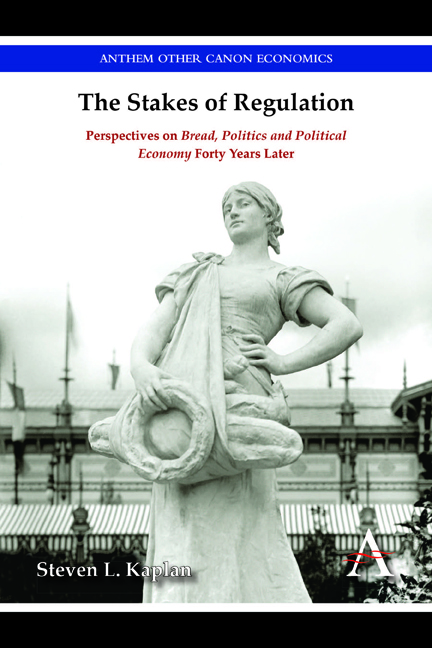Book contents
- Frontmatter
- Dedication
- Contents
- Introduction
- Chapter I (Re-)Thinking Regulation: Police, Prices, Markets
- Chapter II Agriculture and the French Economy of the Old Regime
- Chapter III Collective Action and Its Actors: The Moral Economy and the Market, the People and the Elites, Disorder and Order
- Chapter IV The Parlements in the Age of Economic Enlightenment
- Chapter V Kings and Ministers: Politics and Policies, Finance and Subsistence
- Chapter VI The New Historiography of Political Economy
- Chapter VII Famine, Dearth and Food (In-)Security
- Afterword
- Index
Chapter V - Kings and Ministers: Politics and Policies, Finance and Subsistence
Published online by Cambridge University Press: 20 July 2018
- Frontmatter
- Dedication
- Contents
- Introduction
- Chapter I (Re-)Thinking Regulation: Police, Prices, Markets
- Chapter II Agriculture and the French Economy of the Old Regime
- Chapter III Collective Action and Its Actors: The Moral Economy and the Market, the People and the Elites, Disorder and Order
- Chapter IV The Parlements in the Age of Economic Enlightenment
- Chapter V Kings and Ministers: Politics and Policies, Finance and Subsistence
- Chapter VI The New Historiography of Political Economy
- Chapter VII Famine, Dearth and Food (In-)Security
- Afterword
- Index
Summary
Like the French Revolution, the trial of the king is not over. Feckless in many ways, Louis XVI also paid the price for his once beloved, later detested grandfather Louis XV, who was more kingly in his vices if not his virtues, though we don't know whether he would have faced the guillotine with such surprising equanimity. Still, it is easy to excoriate a king, especially when the monarchy declared itself absolute and of divine instauration: such pretension gave it (and him) little margin for error or for doubt. Yet Michel Antoine, foremost student of the monarchy in our time, is right to emphasize that the exercise of kingship was a “hard job”. The royalist school knows, however, that it cannot count on mitigating circumstances. Thus, its proclivity to radicalize the debate in binary fashion: “monarchy or anarchy,” for example. Since well before the Revolution (and thus, lest our enthusiasm for him induce us to forget, long before Tocqueville), the king was on the defensive, precisely because he was so implicated, so exposed, so (theoretically) omnicompetent and responsible for all outcomes. His advocates, from Voltaire and Jacob-Nicolas Moreau to Pierre Gaxotte and Antoine in the twentieth century, made the correct strategic decision that the best defense was offense. Hence their depiction of the king as a reformer, a modernizer and, despite his expressed horror for innovation, a trailblazer. More liberal partisans of monarchy—liberal in the American denotation of the term—ended up aligning prince and philosophes in the alchemy of Enlightened Despotism, an industrious oxymoron.
Paradoxically, though the parlementary onslaught weakened and discredited the king, it also unwittingly cast him in the role of resistant bearer of the oriflamme, not only (or not primarily) of tradition, but also of Enlightenment-vintage rationality and progress, heralded as the sole alternative to narrow-minded self-regard and reactionary obstructionism. In a certain sense, the Manichean view of the eighteenth century served the interests both of the exponents of kingship and of the parlementary path. Historiography has not yet extricated itself from this impasse, despite robust “revision” on both sides. This chapter looks at the monarch at work with his ministers on some of the principal questions of his time.
- Type
- Chapter
- Information
- The Stakes of RegulationPerspectives on Bread, Politics and Political Economy Forty Years Later, pp. 225 - 266Publisher: Anthem PressPrint publication year: 2015



